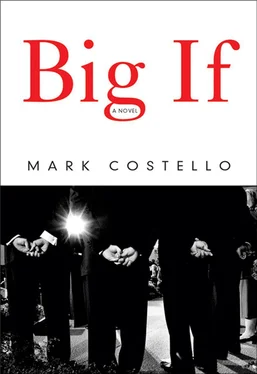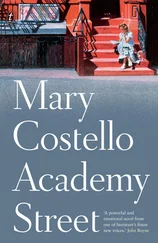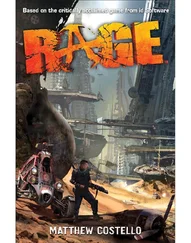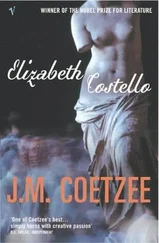Jens spent a year waiting for a hurricane. He checked the shed twice a day. He took his readings to the basement, where he puttered with a soldering iron, or stood in the front yard, cradling Evelyn’s transistor radio, which he had rewired to pick up the static claps of thunderheads offshore. Vi remembered the summer when he rewired all their radios for practice, Evelyn’s bedside AM-FM with the well-worn snoozebar, Walter’s old stereophonic monster in the den, the sleek Toshiba at the kitchen sink.
The coup was uncovered in the afternoon. Evelyn was scheduled to lead a walking tour of the see-touch-smell exhibit at the Fort Odiorne Nature Center. She was in the garden, pouring bonemeal on the roses. She looked up and saw the clouds stacking on the harbor. She wondered if the tour might be rain-delayed. She wondered how to dress and whether an umbrella might be called for. She tried the Toshiba, hoping for the weather, and it buzzed — there were no thunderstorms broadcasting at the time. She played the dial and it buzzed. She tried the stereo in the den, the clock radio upstairs. She summoned Walter from the ladder — he was cleaning gutters — and they tried the cars, the station wagon, then Walter’s red company LeBaron, hearing the same buzz.
Vi followed them around, getting scared. Why would all the radios fail together? Jens said that in a thermonuclear exchange, the Russians would knock out the Top 40 first. Vi wondered if the Russians had finally attacked — it would have been just like them to destroy the world during school vacation. As her father trolled the dial, sitting in the front seat of his car, Vi imagined cities disappearing. Portsmouth’s gone, Nashua is gone—
Walter reassured her. “If the Russians bombed us, Vi, we’d definitely know.”
She thought he meant that they would get a call from Ligourie the lawyer or Boyle the mortician. Portsmouth’s been irradiated, Walt. Better hustle up there and start adjusting.
Carol Cooper was standing on her diving board in short shorts and a big straw hat, vacuuming her pool.
“See?” said Walter. “Everything is fine.”
Vi was nine when her fatherfinally let her go on his adjusting trips. They got up in darkness, preparing for the trips. Vi was in the kitchen, packing sandwiches with Evelyn, luncheon loaf and mayo, an apple for each bag. Walter was upstairs, ironing a crease into his pants. Jens was in his room, hunting for a missing sneaker, half asleep. Walter found him in the closet, curled up among the shoes, and led him like a blind man down the stairs. Vi watched her brother fake his way through breakfast, a fork clutched in his lap, one eye slowly closing, the other eye a slit, his black hair sticking up, a head of exclamation points, his face sleep-dopey and unpunctuated. Evelyn told Jens to eat something. Jens went through the motions, lifting a glass of juice to his nose, biting his waffle, but not chewing. The waffle bite would still be in his mouth as they backed down the driveway, following the inland shore of the heart-shaped marsh, a curve of misty streetlights to I-95. Fifty miles later, heading to Berlin as the sun was coming up, Vi would hear Jens chewing waffle in the front seat and know that he was finally awake.
They went everywhere one summer. They covered the whole state, stopping off in county seats and depot towns. Vi at nine saw things she didn’t understand — a farmhand with one foot, a school without a roof, a golf pro dead from lightning, still grasping the flag.
They saw a paper train derailed outside Berlin. It was timber country up there on the border with Quebec. Berlin was a pulping town, her father said. The wood came in as trees or logs and left as paper by the ton, rolling south along a spur to the Gorham switches. The system went in two directions after that, east along a stony river into Maine or through the mountain notches to St. Johnsbury, Vermont.
It was hot that day. Jens sat in the front seat of Walter’s car, counting seven jackknifed flatcars with his finger, until he couldn’t see past them to the rest. Vi leaned out the window. She saw giant reams of paper unrolled to where they stopped, paper in the gully, on the dirt road, in the woods.
Walter stood on the embankment with the men and mangled train. The men wore suits and ties, or sheriff’s uniforms, or dressed like they worked on the trains. They smoked and spat and pushed their hats back. One of them looked up the tracks and said it was a doozie.
The others said, “Uh- huh ,” and “That’s a fact.”
A man in a white suit said, “What do you think, Walter?” This man was the superintendent of the line. He had flown up from the Maine Central yard in Portland in a bubble helicopter — Vi was totally impressed — yet even this man waited on her father. Walter Asplund had adjusted most of the noteworthy damage around here going back twenty years and was known to be a reasonable man. He didn’t say too much, but when he spoke he spoke for The Connecticut.
The super said, “What are we looking at, you think?”
Walter was looking at the paper in the woods. He said, “You got the fees and spoilage, the rolling stock—”
“Total write-off,” someone said.
“Mm- hm ,” the others said.
“Two men hurt,” the super said. “One fatally. Don’t forget.”
Walter saw it all. He would not be rushed, he would not forget. He sidestepped down the bank, laid his suit coat on the front seat of the car.
“You kids okay?”
Vi said, “We’re okay.”
Jens said, “What happened, Dad?”
Walter stood by the door, unbuttoning his shirt cuffs with a dainty plucking motion. “Not too hot in there?”
Vi said, “We’re okay.”
He rolled his sleeves up, took his time. The men were watching him.
He said, “Let me know if you get too hot. Dogs die in overheated cars, you know.”
The trunk was loaded with the tools of his profession: a bulky camera with a flash, a hundred feet of tape, a wheel on a stick that also measured distance, an adding machine with a roll of paper, spare rolls of paper, a manual typewriter, a bag of flares and stakes, ledger paper, carbon paper, many pads of legal forms, a reel-to-reel recorder, coiled rope, a notary stamp, and a wide flat book, maroon leather, embossed in gold THE CONNECTICUT. Inside the book were blank checks the color of the ocean on a map. The book in the trunk was power. A check from the book was called a settlement. This was what adjusters did, settle or not settle or settle partially, after taking pictures and measuring distances and interviewing witnesses in county seats and depot towns, at train wrecks in the north. Vi felt the bounce as he shut the trunk.
Coming back from Walter’s trips, they always stopped at the Boyles’ house. Phil Boyle was a man about her father’s age, a prosperous mortician-politician, a pillar in his parish and a power in the town. The Boyles lived above their mortuary, a mansard rampart fortress on the shady, stonewalled corner of Main and Derry Turnpike. In the summer, Walter and Phil Boyle would sit out back at the picnic table, drinking coffee in their shirtsleeves. They would talk about the things they had in common, family, taxes, politics. Boyle the mortician was her father’s closest friend, but he always frightened Vi. His hair was black, his suits were black, his winter hats were Homburgs, black, and his hands were long and liver-spotted gray. He always smelled like flowers and he took his coffee black, stirring for no reason Vi could see, the memory of milk, and even the insects were afraid of him. He had served a term for the machine in the state legislature, the lower house, and even in high hatching season, with the salt pond through the pines, Vi never saw him swat at even one blackfly. She believed that he was death itself, living in her town. She stayed by her father on their visits, protecting him from Boyle’s undertow.
Читать дальше












